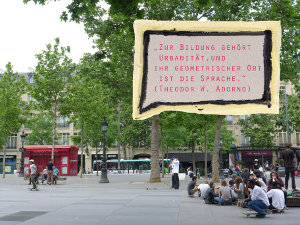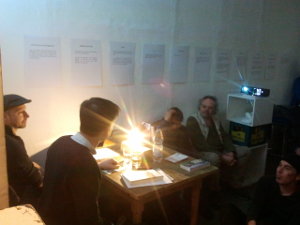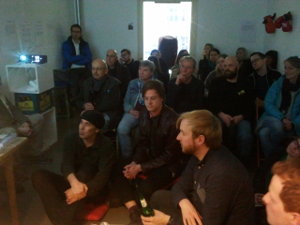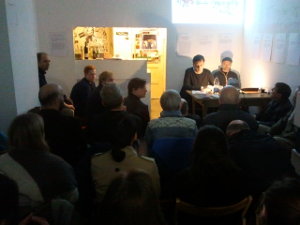



2) Kritik des Provinzialismus (Claus Baumann)
1) Max Beck: Theodor W. Adornos Jargonkritik – eine Einleitung
Der „Jargon der Eigentlichkeit“ (1964) gehört zu den umstrittensten Texten der Kritischen Theorie. Während der Titel inner- und außerhalb der akademischen Debatte längst zu einem geflügelten Wort mutiert ist, steht diesem die Kenntnis des Inhalts diametral gegenüber. Zumeist wird die Schrift als eine Polemik gegen Martin Heidegger abgehandelt, die zu einer „philosophischen Kommunikationsverweigerung“ (Hermann Mörchen) zwischen Frankfurt und Freiburg geführt habe. Plattitüden dieser Art verkennen jedoch den ideologiekritischen Charakter der Streitschrift. Adornos Kritik am neudeutschen Jargon richtet sich keineswegs primär gegen Heidegger, sondern bezieht sich auf ein breites gesellschaftliches Phänomen. Sie hat ihren Ursprung bereits in den 1920er-Jahren in der Kritik Siegfried Kracauers an der Bibel-Übersetzung von Martin Buber und Franz Rosenzweig.
Der im August 2015 erschienene Sammelband "Sprachkritik als Ideologiekritik. Studien zu Adornos ´Jargon der Eigentlichkeit´“ möchte auf die Aktualität von Adornos Kritik hinweisen. Max Beck (Hrsg.) wird in seinem Vortrag mit Rückgriff auf den österreichischen Philosophen Günther Anders darstellen, worum es in Adornos Streitschrift geht und die Kritik am theologisch-metaphysischen Jargon explizieren.
Max Beck (Wien) ist Freier Autor und schreibt u.a. für "Wirkendes Wort" und "literaturkritik.de".
2) Claus Baumann: Kritik des Provinzialismus – Das Recht auf Stadt und die Pflicht zur Entprovinzialisierung
„Stadtluft macht frei“. Der französische Urbanismustheoretiker Henri Lefebvre behauptet, dass dieser mittelalterliche Rechtsspruch auch neuzeitlich noch einen Wahrheitskern besitze. Entsprechend fordert Lefebvre ein „Recht auf Stadt“. Er verbindet damit die Vorstellung eines Rechts nicht marginalisiert und nicht aus dem urbanen Raum verdrängt zu werden. Die Unterscheidung von Urbanität und Provinzialität geht bei Lefebvre weit über die soziologische Beschreibung von städtischem und ländlichem Leben hinaus: für ihn hängen Urbanität und Emanzipation aufs Engste zusammen. Dieser Zusammenhang wird auch von Theodor W. Adorno betont, insbesondere in seinen sprachkritischen Überlegungen zum „Jargon der Eigentlichkeit“. An anderer Stelle und mit Blick auf die Bildung zur Mündigkeit spricht sich Adorno sogar für eine „Pflicht zur Entprovinzialisierung“ aus. Denn die Beschränkung von Bildung durch Provinzialität schränke zugleich die Möglichkeit von Emanzipation ein; im Extremfall stoßen sogar „die ländlichen Verhältnisse … ihre Enterbten in die Barbarei“.
Angesichts der jüngsten Gewaltexzesse weltweit und den autoritativ-repressiven Reaktionen seitens staatlicher Politik gewinnen die Überlegungen jener beiden Gesellschaftskritiker eine erschreckende Aktualität. Anhand der untergründig thematischen Verbindung von Lefebvres und Adornos Reflexionen beleuchtet Claus Baumann den inneren Zusammenhang von Urbanität und emanzipatorischer Bildung sowie das Hand-in-Hand-Gehen von provinzialistischer Ideologie mit Regression und Barbarei.
Claus Baumann ist Gesellschaftstheoretiker und umherschweifender Urbanismuskritiker, nebenbei auch wissenschaftlicher Mitarbeiter am Institut für Philosophie der Universität Stuttgart. Er promovierte 2009 zur Formbestimmung von Arbeit. Seine Arbeitsschwerpunkte sind Gesellschaftstheorie und Philosophie der Ästhetik.
Zuletzt in der Oberwelt 2012
Buchvorstellung Freitag, 8. April 2016, 19.30 Uhr
Adorno
Theme Evening
1) Theodor W. Adorno’s Jargon Critique (Max Beck)
2) Critique of Provincialism (Claus Baumann)
Book presentation: Sprachkritik als Ideologiekritik. Studien zu Adornos
"Jargon der Eigentlichkeit (Language critique as critique of
ideology. Studies of Adorno’s “Jargon of Authenticity”)
1) Max Beck: Theodor W. Adorno’s Jargon Critique – An introduction
“The Jargon of Authenticity” (1964, English translation 1973) is one
of the most controversial texts in critical theory. Although the title
has long since mutated into a dictum, this is diametrically opposed
to the knowledge of the contents. The paper is most commonly treated
as a polemic against Martin Heidegger that resulted in a “refusal
of philosophical communication” (Hermann Mörchen) between Frankfurt
and Freiburg. However, platitudes of this kind fail to recognise the
aspect of ideological critique inherent in the polemic. Adorno’s criticism
of new German jargon is by no means aimed primarily at Heidegger;
instead it refers to a wider social phenomenon. Its origins date back
to Siegfried Kracauer’s criticism of the Martin Buber and Franz Rosenzweig
translation of the Bible in the 1920s.
The anthology “Sprachkritik als Ideologiekritik. Studien zu Adornos
"Jargon der Eigentlichkeit”, published in August 2015, aims to
highlight the topicality of Adorno’s critique. Drawing on the Austrian
philosopher Günther Anders, Max Beck (ed.) will illustrate in his
lecture what Adorno’s polemic is about and expatiate the critique
of theologico-metaphysical jargon.
Max Beck (Vienna) is a freelance author and writes, among other things,
for “Wirkendes Wort” and “literaturkritik.de”.
2) Claus Baumann: Critique of Provincialism – The right to the city
and the duty to de-provincialisation.
“Stadtluft macht frei” (English: City air makes you free). The French
urban theorist Henri Lefebvre claims that this medieval principle
of law still holds true in modern times. Accordingly, Lefebvre demands
a “right to the city”. He associates this with the idea of the right
not to be marginalised and not to be driven out of urban space. For
Lefebvre the difference between urbanity and provinciality goes far
beyond the sociological description of urban and rural life: for him
urbanity and emancipation are closely linked. This connection is also
emphasised by Theodor W. Adorno, particularly in his critical reflections
on language in “The Jargon of Authenticity”. Elsewhere and with a
view to the development of responsibility, Adorno even advocates a
“duty to de-provincialisation”. He claims the limitation of development
through provincialism simultaneously limits the opportunities for
emancipation and in extreme cases “rural conditions” can even drive
the “disinherited into barbarism”.
In light of the most recent extreme acts of violence around the globe
and the repressive authoritative reactions on the part of national
politics, the thoughts of both these social critics have become increasingly
topical. Based on the underlying thematic connection between Lefebvre’s
and Adorno’s reflections, Claus Baumann examines the fundamental link
between urbanity and emancipatory development as well as the theory
that provincial ideology goes hand in hand with regression and barbarism.
Claus Baumann is a social critic and an excursive urban critic; in
addition he is a research associate at the Institute for Philosophy
at the University of Stuttgart. In 2009, he completed his doctorate
in the definition of forms of labour. His areas of focus are social
theory and the philosophy of aesthetics.
Last at Oberwelt in 2012.
Book presentation, Friday
8th April 2016, 7.30 pm